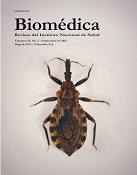Genetic variants associated with fetal hemoglobin levels show the diverse ethnic origin in Colombian patients with sickle cell anemia
Abstract
Introduction: Fetal hemoglobin is an important factor in modulating the severity of sickle cell anemia. Its level in peripheral blood underlies strong genetic determination. Associated loci with increased levels of fetal hemoglobin display population-specific allele frequencies.
Objective: We investigated the presence and effect of known common genetic variants promoting fetal hemoglobin persistence (rs11886868, rs9399137, rs4895441, and rs7482144) in 60 Colombian patients with sickle cell anemia.
Materials and methods: Four single nucleotide polymorphisms (SNP) were genotyped by restriction fragment length polymorphisms (RFLP) and the use of the TaqMan procedure. Fetal hemoglobin (HbF) from these patients was quantified using the oxyhemoglobin alkaline denaturation technique. Genotype frequencies were compared with frequencies reported in global reference populations.
Results: We detected genetic variants in the four SNPs, reported to be associated with higher HbF levels for all four SNPs in the Colombian patients. Genetic association between SNPs and HbF levels did not reach statistical significance. The frequency of these variants reflected the specific ethnic make-up of our patient population: A high prevalence of rs7482144-‘A’ reflects the West-African origin of the sickle cell mutation, while high frequencies of rs4895441-‘G’ and rs11886868-‘C’ point to a significant influence of an Amerindian ethnic background in the Colombian sickle cell disease population.
Conclusion: These results showed that in the sickle cell disease population in Colombia there is not a unique genetic background, but two (African and Amerindian). This unique genetic situation will provide opportunities for a further study of these loci, such as fine-mapping and molecular-biological investigation. Colombian patients are expected to yield a distinctive insight into the effect of modifier loci in sickle cell disease.
Downloads
Some similar items:
- Claudia Liliana Durán, Olga Lucía Morales, Sandra Johanna Echeverri, Mario Isaza, Beta globin haplotypes in hemoglobin S carriers in Colombia , Biomedica: Vol. 32 No. 1 (2012)
- Diana María Valencia, Carlos Andrés Naranjo, María Victoria Parra, María Antonieta Caro, Ana Victoria Valencia, Carlos José Jaramillo, Gabriel Bedoya, Association and interaction of AGT, AGTR1, ACE, ADRB2, DRD1, ADD1, ADD2, ATP2B1, TBXA2R and PTGS2 genes on the risk of hypertension in Antioquian population , Biomedica: Vol. 33 No. 4 (2013)
- Greta Rodríguez-Arroyo, Irene Paradisi, Merlyn Vívenes-Lugo, Dinorah Castro-Guerra, Álvaro Rodríguez-Larralde, LEP, LDLR and APOA4 gene polymorphisms and their relationship with the risk of overweight, obesity and chronic diseases in adults of the State of Sucre, Venezuela , Biomedica: Vol. 36 No. 1 (2016)
- María Teresa Arango, Carlos Jaramillo, María Camila Montealegre, Mabel Helena Bohórquez, María del Pilar Delgado, Genetic characterization of the interleukin 1 β polymorphisms -511, -31 y +3954 in a Colombian population with dyspepsia , Biomedica: Vol. 30 No. 2 (2010)
- Lorena Matta, Mario M. Barbosa, Cristhian D. Morales-Plaza, Clinical profile of dengue in patients consulting a tertiary hospital in the city of Cali, Colombia, 2013 , Biomedica: Vol. 36 No. 1 (2016)
- Ana Victoria Valencia, Ana Lucía Páez, María Elena Sampedro, Clara Ávila, Julio Cesar Cardona, Catalina Mesa, Lina Galvis, Jaime Carrizosa, Mauricio Camargo, Andrés Ruíz, William Cornejo, Gabriel Bedoya, Evidence for association and epistasis between the genetic markers SLC6A4 and HTR2A in autism etiology , Biomedica: Vol. 32 No. 4 (2012)
- Olga María Moreno, Clara Isabel González, Diego Luis Saaibi, William Otero, Reynaldo Badillo, Javier Martín, Gerardo Ramírez, Polymorphisms of IL-10 gene promoter and rheumatoid arthritis in a Colombian population , Biomedica: Vol. 27 No. 1 (2007)
- Nora Cardona-Castro, Miryan Sánchez-Jiménez, Winston Rojas, Gabriel Bedoya-Berrío, IL-10 gene promoter polymorphisms and leprosy in a Colombian population sample , Biomedica: Vol. 32 No. 1 (2012)
- Rosa Magdalena Uscátegui, Adriana M. Correa, Jaime Carmona-Fonseca, Changes in retinol, hemoglobin and ferritin concentrations in Colombian children with malaria , Biomedica: Vol. 29 No. 2 (2009)
- Iván Peña, Juan Sarmiento, Cristian Porras, Ximena Cediel , Ana Camargo, Myelopathy due to copper deficiency: A case series and review of the literature , Biomedica: Vol. 43 No. 2 (2023)
| Article metrics | |
|---|---|
| Abstract views | |
| Galley vies | |
| PDF Views | |
| HTML views | |
| Other views | |


























